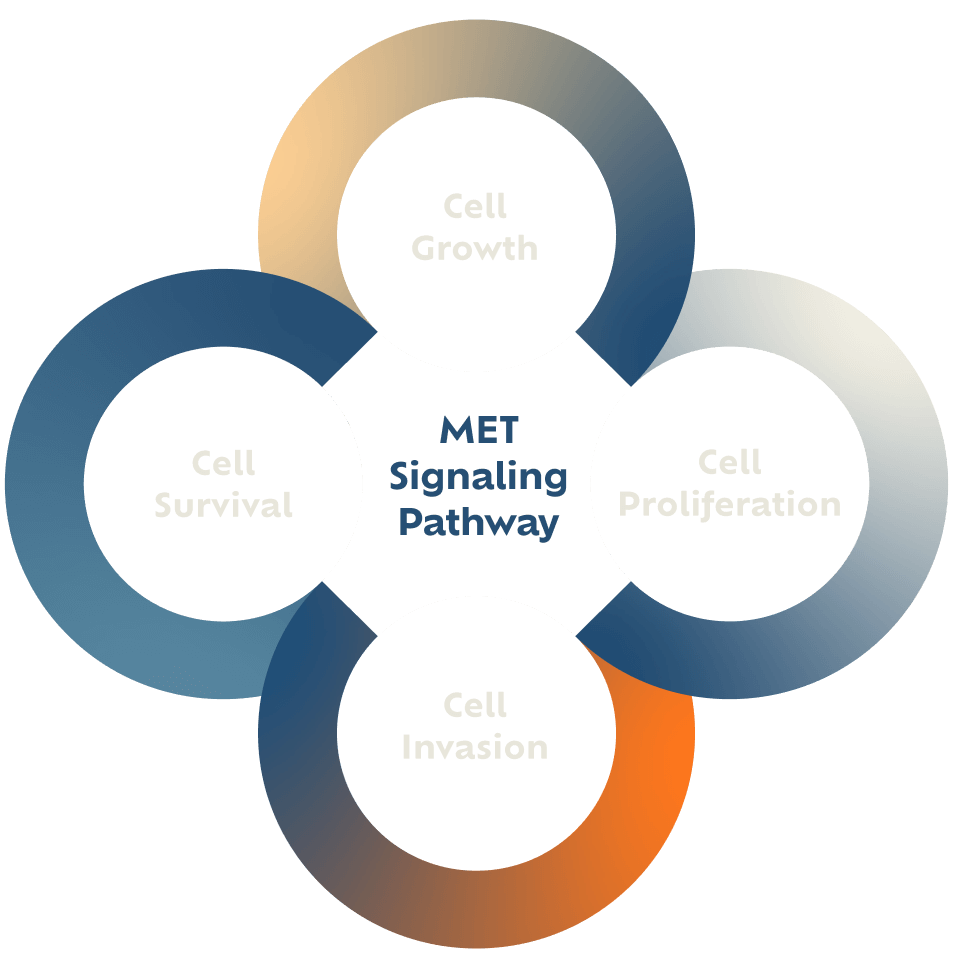EXPLORE MET PROGNOSIS IN NSCLC
*Estimated prevalence in non-squamous NSCLC. Imagery is for illustrative purposes only and does not
proportionally represent biomarker prevalence as shown.
MET Dysregulation in NSCLC
MET signaling in NSCLC becomes dysregulated through mechanisms including, but not limited to,
c-Met overexpression, MET gene amplification, and METex14 skipping.2
MET signaling dysregulation can play a key role in promoting cancer cell growth, proliferation, invasion, and apoptosis prevention, which can lead to poorer prognosis.2,11


MET Biomarkers and Poorer Prognosis
Patients with MET aberrations may face poorer prognosis in NSCLC, including METex14 skipping (~2%-4% prevalence) and MET amplification (~2%-5% prevalence).2,6,10 c-Met protein overexpression may reveal poorer prognosis in ≥25% of patients.1,2
MET aberration prevalence estimates and prognosis statements are based on multiple sources. Survival and prevalence data can vary among studies and data sets because of detection methodology used and patient sample sizes and/or demographic characteristics. Some patients may have more than one MET aberration.
Exploring the Impact of MET Biomarkers on Survival
Patients with METex14 skipping have a poorer prognosis in NSCLC (HR=1.993; 95% CI: 1.023-3.882), as do patients with MET amplification (HR=4.904; 95% CI: 2.017-11.927).6
Data suggest that patients with c-Met protein overexpression may have almost double the risk of death compared to patients without c-Met protein overexpression (unadjusted HR=2.04; 95% CI: 1.02-4.10).†10

‡Patients censored at clinical trial enrollment, last follow-up, or development of a new primary lung cancer. MET aberration statements are based on multiple sources. Survival data can vary among studies and data sets because of detection methodology used and patient sample sizes and/or demographic characteristics. Some patients may have more than one MET aberration.
c-Met protein overexpression and MET gene amplification are emerging biomarkers in clinical research as potential therapeutic targets.
There are no FDA-approved tests for c-Met protein overexpression or MET gene amplification.
Biomarkers included are select MET aberrations that are both emerging and established biomarkers in NSCLC. This is not an exhaustive list of all NSCLC biomarkers and selected MET aberrations may overlap with other NSCLC biomarkers.
MET aberration prevalence estimates and prognosis statements are based on multiple sources. Survival and prevalence data can vary among studies and data sets because of detection methodology used, patient sample sizes, and/or demographic characteristics. Some patients may have more than one MET aberration.
Next:
Biomarker Testing
